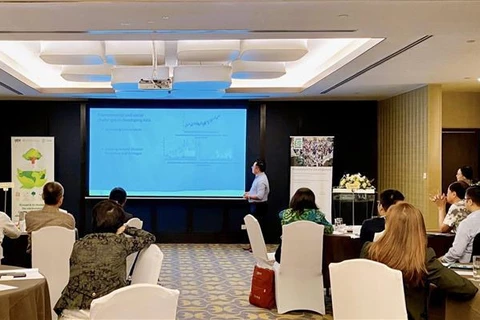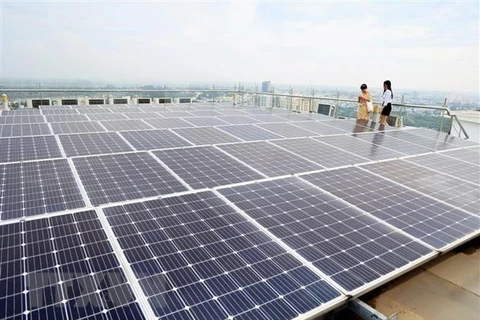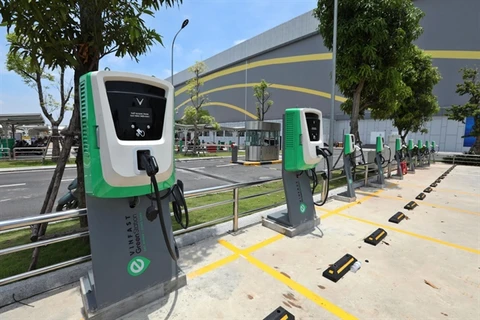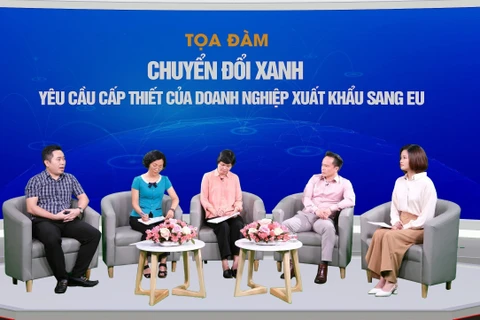Hanoi (VNS/VNA) - The EU's effort to cut carbon emissions globally is going into high gear as the bloc's Carbon Border Adjustment Mechanism (CBAM) entered its transitional phase on October 1.
As of October 1, the EU's trading partners will have to report greenhouse gas (GHG) emissions embedded in six carbon-intensive exports, which consist of steel, cement, aluminium, fertiliser, hydrogen, and electricity.
From 2026, they will also be required to purchase CBAM certificates to cover the GHG footprint, and the prices of CBAM certificates will be calculated based on the weekly average auction price of EU ETS allowances.
Nguyen Hoa Cuong, Vice Director of the Central Institute for Economic Management, said Bangladesh's staggering growth in apparel exports over the past few years speaks volumes about how "going green" has paid off commercially.
He urged Vietnam to take action to keep its industries well-prepared for the tax regime. He said meeting CBAM requirements would serve Vietnamese producers well by allowing their products to be sold at a higher price in the EU markets.
"It's all about not being left behind in the global green supply chains," said Cuong.
Nguyen Van Hoi, General Director of the Vietnam Institute of Strategy and Policy for Industry and Trade, said reports on GHG emissions had become compulsory for Vietnamese steel producers, whose exports to the EU had doubled in volume in the first eight months of 2023.
He also said CBAM would initially apply to certain carbon-intensive exports but would expand in scope in the long term to cover products in other sectors, including food and energy.
He called for financial packages to support Vietnamese enterprises in capability-building and transition to greener technologies. He also urged enterprises to improve their energy efficiency and cut back on carbon emissions to get the go-ahead to the EU markets.
Economic expert Vu Dinh Anh said carbon certificates were under development in Vietnam and would come into force in the near future. He also said the EU's green regulations would incentivise Vietnamese enterprises to go green and promote legal changes that work in favour of the environment.
A team of researchers from the University of Economics and Business was concerned that CBAM would incur huge carbon-emission-linked costs to Vietnamese enterprises on the horizon.
The team called for measures to help them cut back on carbon emissions, thereby improving the competitive advantages of their products in the EU markets. It also urged policymakers to bring them up to speed on the tax regime and called for a mechanism for carbon pricing in Vietnam./.
As of October 1, the EU's trading partners will have to report greenhouse gas (GHG) emissions embedded in six carbon-intensive exports, which consist of steel, cement, aluminium, fertiliser, hydrogen, and electricity.
From 2026, they will also be required to purchase CBAM certificates to cover the GHG footprint, and the prices of CBAM certificates will be calculated based on the weekly average auction price of EU ETS allowances.
Nguyen Hoa Cuong, Vice Director of the Central Institute for Economic Management, said Bangladesh's staggering growth in apparel exports over the past few years speaks volumes about how "going green" has paid off commercially.
He urged Vietnam to take action to keep its industries well-prepared for the tax regime. He said meeting CBAM requirements would serve Vietnamese producers well by allowing their products to be sold at a higher price in the EU markets.
"It's all about not being left behind in the global green supply chains," said Cuong.
Nguyen Van Hoi, General Director of the Vietnam Institute of Strategy and Policy for Industry and Trade, said reports on GHG emissions had become compulsory for Vietnamese steel producers, whose exports to the EU had doubled in volume in the first eight months of 2023.
He also said CBAM would initially apply to certain carbon-intensive exports but would expand in scope in the long term to cover products in other sectors, including food and energy.
He called for financial packages to support Vietnamese enterprises in capability-building and transition to greener technologies. He also urged enterprises to improve their energy efficiency and cut back on carbon emissions to get the go-ahead to the EU markets.
Economic expert Vu Dinh Anh said carbon certificates were under development in Vietnam and would come into force in the near future. He also said the EU's green regulations would incentivise Vietnamese enterprises to go green and promote legal changes that work in favour of the environment.
A team of researchers from the University of Economics and Business was concerned that CBAM would incur huge carbon-emission-linked costs to Vietnamese enterprises on the horizon.
The team called for measures to help them cut back on carbon emissions, thereby improving the competitive advantages of their products in the EU markets. It also urged policymakers to bring them up to speed on the tax regime and called for a mechanism for carbon pricing in Vietnam./.
VNA
























